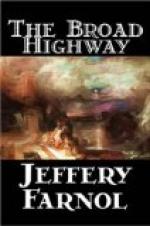“Ancient,” said I, “what might you be driving at?”
“Love, Peter!”
“Love!” said I, letting go the handle of the bellows.
“An’ marriage, Peter.”
“What in the world—put—such thoughts into your head?”
“You did, Peter.”
“I?”
“Ah!—some men is born lovers, Peter, an’ you be one. I never see such eyes as yourn afore, so burnin’ ’ot they be. Ah, Peter! some maid will see the lovelight aflame in ’em some day, an’ droop ’er ‘ead an’ blush an’ tremble—for she’ll know, Peter, she’ll know; maids was made to be loved, Peter—”
“But, Ancient, I am not the kind of man women would be attracted by. I love books and solitude, and am called a—pedant! and, besides, I am not of a loving sort—”
“Some men, Peter, falls in love as easy as they falls out; it comes to some soft an’ quiet—like the dawn of a summer’s day, Peter; but to others it comes like a gert an’ tur’ble storm—oh, that it do! Theer’s a fire ready to burn up inside o’ ye at the touch o’ some woman’s ‘and, or the peep o’ ’er eye—ah! a fire as’ll burn, an’ burn, an’ never go out again—not even if you should live to be as old as I be—an’ you’ll be strong an’ wild an’ fierce wi’ it—an’ some day you’ll find ‘er, Peter, an’ she’ll find you—”
“And,” said I, staring away into the distance, “do you think that, by any possible chance, she might love me, this woman?”
“Ay, for sure,” said the Ancient, “for sure she will; why don’t ’ee up an ax ‘er? Wi’ a fine round moon over-’ead, an’ a pretty maid at your elber, it’s easy enough to tell ’er you love ’er, aren’t it?”
“Indeed, yes,” said I, beginning to rub my chin, “very easy!” and I sighed.
“An’ when you looks into a pair o’ sweet eyes, an’ sees the shine o’ the moon in ’em—why, it aren’t so very fur to ’er lips, are it, Peter?
“No,” said I, rubbing my chin harder than ever; “no—and there’s the danger of it.”
“Wheer’s t’ danger, Peter?”
“Everywhere!” I answered; “in her eyes, in her thick, soft hair, the warmth of her breath, the touch of her hand, the least contact of her garments—her very step!”
“I knowed it!” cried the Ancient joyfully, peering at me under his brows; “I knowed it!”
“Knew what?”
“You be in love—good lad! good lad!” and he flourished his pipe in the air.
“In love!” I exclaimed; “in love—I?”
“Sure as sure!”
“But love, according to Aristotle, is—”
“Love, Peter, is what makes a man forget ‘is breakfus’, an’ ’is work, an’ ’is—”
“But I work very hard—besides—”
“Love is what makes a man so brave as a lion, Peter, an’ fall a-tremblin’ like a coward when She stands a-lookin’ up at ’im; love makes the green earth greener, an’ the long road short—ah! almost too short, sometimes, the love of a woman comes betwixt a man an’ all evils an’ dangers—why don’t ‘ee up an’ ax ’er, Peter?”




